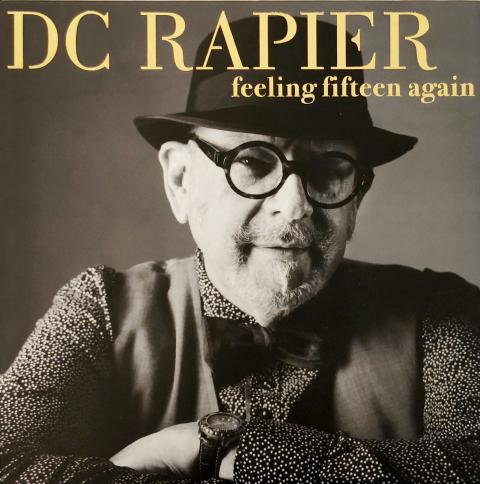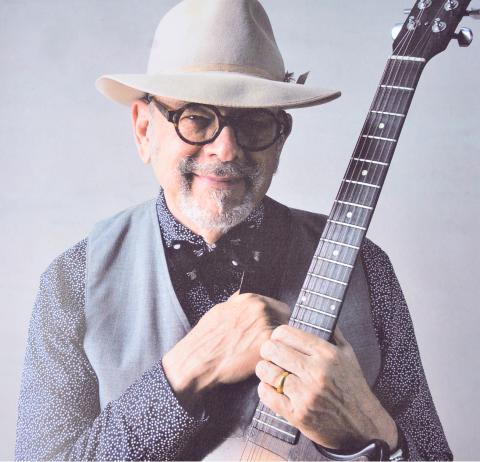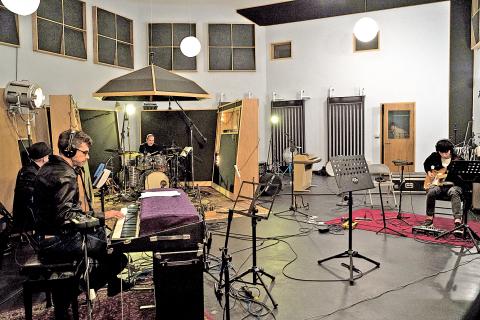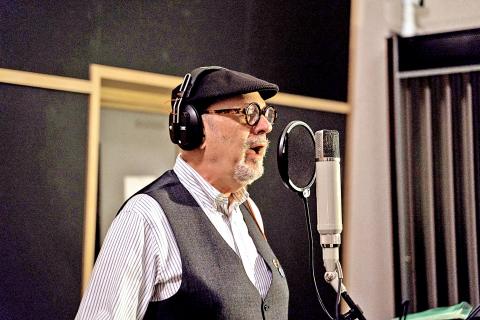The fountain of youth does exist, and music producer Andrew Page can attest to that.
Over one month of rehearsals, he watched expat bluesman DC Rapier transform from an aging man trying to cross off his bucket list to an energetic teenager hitting the stage for the first time at his hometown battle of the bands.
“I noticed weight changes. Body changes. Smiles. Optimism,” Page says. “A whole new person had emerged. He wasn’t a 68-year-old man anymore, but a kickass 15-year-old in a 68-year-old body. He was excited about his life again.”

Photo courtesy of Andrew Page
Exactly 50 years after Rapier failed to make his first album in Nashville, his first solo effort, the aptly-titled Feeling Fifteen Again, hit the shelves in Taiwan. While Rapier’s blues chops are readily noticeable in this collection of 13 original songs, the genre he’s usually known for takes a backseat here as he describes the sound as “classic American — rock ‘n’ roll, R&B with a little smattering of soul, touches of jazz, some gospel.” Influences from the American songbook are evident, which Rapier says he started learning about four years ago.
Although it’s the culmination of 53 years of musical experience, the record isn’t a retrospective since most of the songs were written within the past seven or eight years, Rapier says, making the lyrics relatable to a more mature audience, or in Page’s words, “any man over the age of 55.”
“It’s all based on personal experience, some of it really, really personal,” Rapier says. “The 15-year-old me would have liked a lot of it, but some of it I don’t think he would have understood or appreciated.”

Photo courtesy of Andrew Page
OLD SCHOOL PROCESS
Rapier’s musical aspirations did not stop after he moved to Taiwan in 1989, but they became more of a side gig as he taught English full time and got married. He found time to form the Blues Society on Taiwan and recorded an album with his Chicago-style blues outfit, Bopomofo, in 2009, but his dream to have his own solo album went unfulfilled. Part of it was laziness, he admits.
Last year, Rapier retired from teaching and spent the summer touring the US with his sister-in-law’s blues outfit, the Mary Jo Curry Band. They passed through many places Rapier had played in his youth, rekindling a hunger inside him that he wanted to sustain after he returned to Taiwan. He had also cashed out on the stock market and realized that he actually had the money to do this. By hiring a producer, Rapier did not have to worry about getting musicians together and juggling their schedules and personalities — all he had to do was focus on the music.

Photo courtesy of Andrew Page
Meanwhile, Page and local singer-songwriter Joanna Wang (王若琳) were rehearsing for a new album in Rapier’s basement studio.
“That was inspiration too,” Rapier says. “I realized that if they could put an album together in my basement, why couldn’t I?”
Rapier got to talking with Page, and eventually handed him a thumb drive with 25 songs. Rapier says he had to convince Page that it was more than just a bucket list project, while Page had to make sure that Rapier had the conviction to go through the grueling process.

Photo courtesy of Andrew Page
“He asked me when I wanted to start,” Rapier says. “I said right away. Why wait? I’ve been waiting for 50 years.”
The two worked together for a month with the help of an artist facilitator, with the goal of not only narrowing down and fine-tuning the songs but also to figure out “who is this person — all aspects of him — and what does he really want with this album,” Page says.
Things were done old school. The musicians were not given charts, but recordings of Page and Rapier’s rehearsals, and had to come up with their own material. Instead of recording each instrument separately, the bulk of the album was done as a live band. And the whole thing was recorded over 10 straight, 10-to-12 hour, days in Nangang District’s (南港) Yuchen Cinema Studio (玉成戲院錄音室), and mastered in the US.
SONGS FOR THE YOUNG AT HEART
Page says the meat of the album is the third, fourth and fifth tracks, which Rapier wrote during their month of rehearsal. Small Town Boys, Never Thought I Could Feel This Way and Feeling Fifteen Again all capture Rapier’s reversion to his teenage self, and Page could clearly see a man who is “ecstatic and joyful” as he never thought he could feel 15 again.
Rapier, however, cites Keep On Rollin’ as the most personal song, although he didn’t realize it at first.
“After it had been recorded, I realized I was talking about my father. There’s my religious upbringing, and personal memories of being very, very poor in the US at 10, 11, 12 years old.”
One of his favorite tracks is Older Than I Look, which is a narrative about an old man trying to keep up with modern social norms — namely how women want to be treated. He greets a young waitress with “Howdy, Hon! You’re new here. Wontcha tell me what’s your name?” only to be berated by her.
“It’s about the relationship between male and female, but there’s nothing romantic in this song. The old man greets her in a way that sounds to a millenial as if the guy is trying to come on to her in a sexual way or treat her without respect. She puts him in his place, and he realizes, yeah, things have changed, but I’m not trying to come on to you. I just want to get some food. Help me out here.”
The songs are upbeat in general as Rapier tries to express his understanding of life and the difficulties of getting older without being too heavy — except for Wildwood, which is about unrequited love.
The album’s completion did not cross an item for Rapier’s bucket list after all. Instead, he sees it as the beginning of something bigger, and hopes to use this production to fuel further endeavors including a second album. Page is convinced that Rapier can do it.
“I’ve never seen anyone like that who’s willing to pour his entire life into this thing,” Page says. “Before he probably saw [music] as more of a hobby, but this album puts him in the category of a real artist.”

Aug. 25 to Aug. 31 Although Mr. Lin (林) had been married to his Japanese wife for a decade, their union was never legally recognized — and even their daughter was officially deemed illegitimate. During the first half of Japanese rule in Taiwan, only marriages between Japanese men and Taiwanese women were valid, unless the Taiwanese husband formally joined a Japanese household. In 1920, Lin took his frustrations directly to the Ministry of Home Affairs: “Since Japan took possession of Taiwan, we have obeyed the government’s directives and committed ourselves to breaking old Qing-era customs. Yet ... our marriages remain unrecognized,

During the Metal Ages, prior to the arrival of the Dutch and Chinese, a great shift took place in indigenous material culture. Glass and agate beads, introduced after 400BC, completely replaced Taiwanese nephrite (jade) as the ornamental materials of choice, anthropologist Liu Jiun-Yu (劉俊昱) of the University of Washington wrote in a 2023 article. He added of the island’s modern indigenous peoples: “They are the descendants of prehistoric Formosans but have no nephrite-using cultures.” Moderns squint at that dynamic era of trade and cultural change through the mutually supporting lenses of later settler-colonialism and imperial power, which treated the indigenous as

An attempt to promote friendship between Japan and countries in Africa has transformed into a xenophobic row about migration after inaccurate media reports suggested the scheme would lead to a “flood of immigrants.” The controversy erupted after the Japan International Cooperation Agency, or JICA, said this month it had designated four Japanese cities as “Africa hometowns” for partner countries in Africa: Mozambique, Nigeria, Ghana and Tanzania. The program, announced at the end of an international conference on African development in Yokohama, will involve personnel exchanges and events to foster closer ties between the four regional Japanese cities — Imabari, Kisarazu, Sanjo and

By 1971, heroin and opium use among US troops fighting in Vietnam had reached epidemic proportions, with 42 percent of American servicemen saying they’d tried opioids at least once and around 20 percent claiming some level of addiction, according to the US Department of Defense. Though heroin use by US troops has been little discussed in the context of Taiwan, these and other drugs — produced in part by rogue Chinese Nationalist Party (KMT) armies then in Thailand and Myanmar — also spread to US military bases on the island, where soldiers were often stoned or high. American military policeman